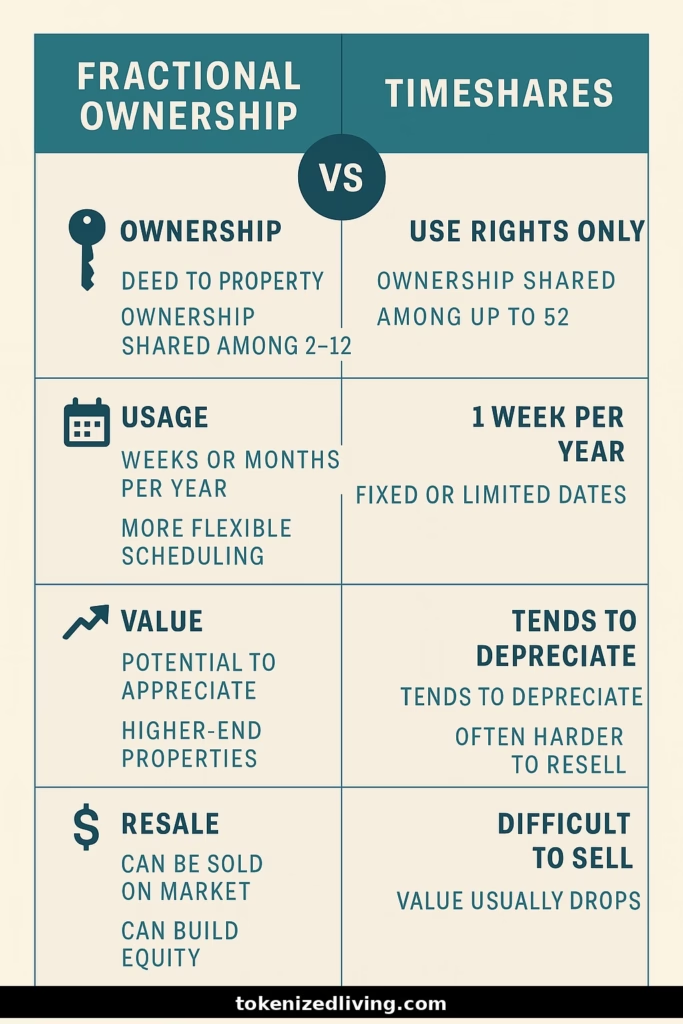Fractional ownership gives buyers a real deeded stake in a vacation property—often shared among 2–12 owners—and offers usage flexibility, equity potential, and resale options. Timeshares grant only usage rights for a set week or point-system stay, tend to depreciate, and are notoriously hard to sell.
“The most important distinguishing factor between modern fractionals and traditional timeshares is the number of owners per home … Most timeshares involve as many as 52 owners per unit … By contrast, most fractionals involve 2–12 owners … meaning owners visit more frequently and stay longer.”
— Andy Sirkin, expert on fractional ownership
If you’ve ever thought about owning a vacation home or getting into real estate, you’ve probably come across the terms “fractional ownership” vs “timeshares.” At first glance, they might seem like the same thing—both involve shared ownership of vacation properties—but they’re actually quite different. Whether you’re looking to enjoy annual vacations or make a smart real estate investment, it’s important to understand how these options compare.
So, What Exactly Is Fractional Ownership?
Imagine owning part of a luxurious vacation home without having to buy the whole property yourself. That’s the essence of fractional ownership. You, along with other individuals, each own a share of the property—often 1/4th, 1/8th, or some other fraction. The key difference here is that you actually own a portion of the property. This means your name is on the deed, just like if you bought a house outright.
One of the perks of fractional ownership is that it comes with proportional rights. For example, if you own 1/4th of the property, you typically get about 13 weeks of use each year. It’s like having your own vacation home, but without the full financial burden. And because a management company usually takes care of maintenance and scheduling, you get to enjoy your property without worrying about upkeep.
What About Timeshares?
Now, let’s talk timeshares. Timeshares are another form of shared vacation property, but they operate differently. Instead of owning part of the property, you buy the right to use it for a set period each year—often one week. That’s it. You don’t actually own any of the property itself, just the right to stay there during your allotted time.
Timeshares are usually tied to resorts or vacation complexes, and the cost varies depending on the time of year you buy. For example, buying a week during the holidays can be pricey, while off-peak weeks are more affordable. The catch? You’ll only have access to the property for that specific week each year unless you buy more time or pay extra fees to switch dates.

Key Differences Fractional Ownership vs Timeshares
So, what makes fractional ownership vs timeshares so different? Let’s break it down.
Ownership Structure
Fractional Ownership: When you buy into fractional ownership, you get a deed. This means you legally own part of the property, and you can sell, rent, or pass it on to your heirs.
Timeshares: With a timeshare, you don’t own any part of the property. You’re simply buying the right to use it for a specific time each year. You can’t sell the property itself, and reselling your timeshare can be difficult.
Investment Value
Fractional Ownership: Because you hold a deed, your share of the property can appreciate in value over time. If the property increases in value, so does your investment. It’s real estate, after all.
Timeshares: Unfortunately, timeshares tend to depreciate. They’re notoriously tough to resell, and you’re unlikely to get back what you paid when trying to sell.
Flexibility
Fractional Ownership: Fractional ownership offers more flexibility. You can typically use the property for a more extended period (like 12-13 weeks per year) and swap weeks with other owners if needed. Some agreements even allow you to rent out your unused time.
Timeshares: Timeshares are less flexible. You’re locked into a specific week each year, and while some programs offer the option to swap dates, it can be expensive and difficult to coordinate.

Maintenance and Management
Fractional Ownership: A management company usually handles maintenance, but the costs are divided among fewer owners. This often results in more personalized service and transparent costs.
Timeshares: Timeshare owners also pay maintenance fees, but these fees can increase over time, and you have little say in how the property is managed.
Usage Rights
Fractional Ownership: You have more control over when and how you use the property based on your share. For instance, owning 1/4th of the property typically gives you 13 weeks of access each year—much more than the one-week of use timeshare owners get.
Timeshares: Timeshare owners are usually limited to one week per year unless they purchase additional time or negotiate an exchange.
Why Fractional Ownership Might Be a Smarter Investment
Looking at the differences, fractional ownership often comes out ahead as the better investment option. Here’s why:
Potential for Appreciation
Fractional ownership is like owning traditional real estate. The property can increase in value over time, meaning your share can appreciate as well. If the market is favorable, you could sell your share for a profit down the line. Timeshares, on the other hand, tend to lose value and are notoriously difficult to resell.
With fractional ownership, you have far more flexibility in how you use and manage your investment. You can sell your share, rent it out for extra income, or pass it down to your family. Timeshares, however, are harder to offload—resale markets are often flooded with low-demand timeshares, making it tough to break even.
Better Control Over Costs
While both options come with management fees, fractional ownership often has more predictable and transparent costs. You know what you’re paying for, and because there are fewer owners, you have more say in how the property is maintained. In contrast, timeshare maintenance fees can rise unexpectedly, leading to long-term financial headaches.
Greater Control Over the Property
As a fractional owner, you have a direct stake in the property. This means you can have a say in renovations, upgrades, or other decisions affecting the property. With timeshares, you’re at the mercy of the resort or management company.
Conclusion: Fractional Ownership vs Timeshare. Which Is the Right for You?
At the end of the day, fractional ownership vs timeshares both offer a way to enjoy vacation properties without buying a second home outright. However, if you’re looking for an option that offers flexibility, potential appreciation, and long-term value, fractional ownership clearly comes out on top.
Timeshares can be great for those who just want a guaranteed vacation spot without the commitment of ownership, but for those thinking long-term or looking for an investment, fractional ownership is the smarter move. It gives you the perks of real estate ownership without the full financial burden.
So, if you’re thinking about investing in a vacation property, fractional ownership is a great way to enjoy your dream home—and potentially see some returns along the way.
❓ FAQ – Fractional Ownership vs. Timeshares
Fractional ownership gives you a deeded share in the property itself—you’re part owner. With timeshares, you only buy the right to use the property for a fixed period each year.
Fractional ownership often appreciates as property values rise, and you can resell your share. Timeshares generally lose value and can be nearly impossible to resell.
With fractionals you typically get weeks or even months per year, can swap time, rent it out, or share with others. Timeshares usually lock you into one fixed or floating week annually with limited flexibility.
Fractional ownership involves higher upfront cost but shared management and predictable ongoing maintenance fees. Timeshares often have lower initial costs but rising annual fees and limited control.
As fractional owners, you’re on the deed and often have voting rights or HOA-like control over the property. Timeshare owners have virtually no control over management or property decisions.
Ideal for resale-savvy buyers interested in longer use, higher-end properties, equity growth, and shared responsibility. Timeshares suit users who want a simple vacation fix without property ownership complexity.
We use AI tools to enhance research and drafting, always under human supervision.

